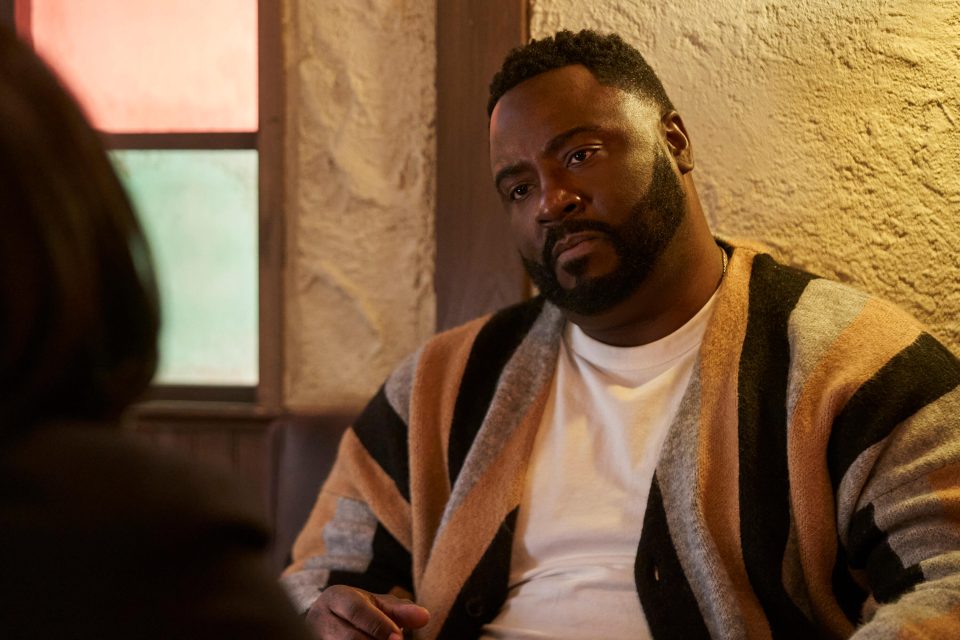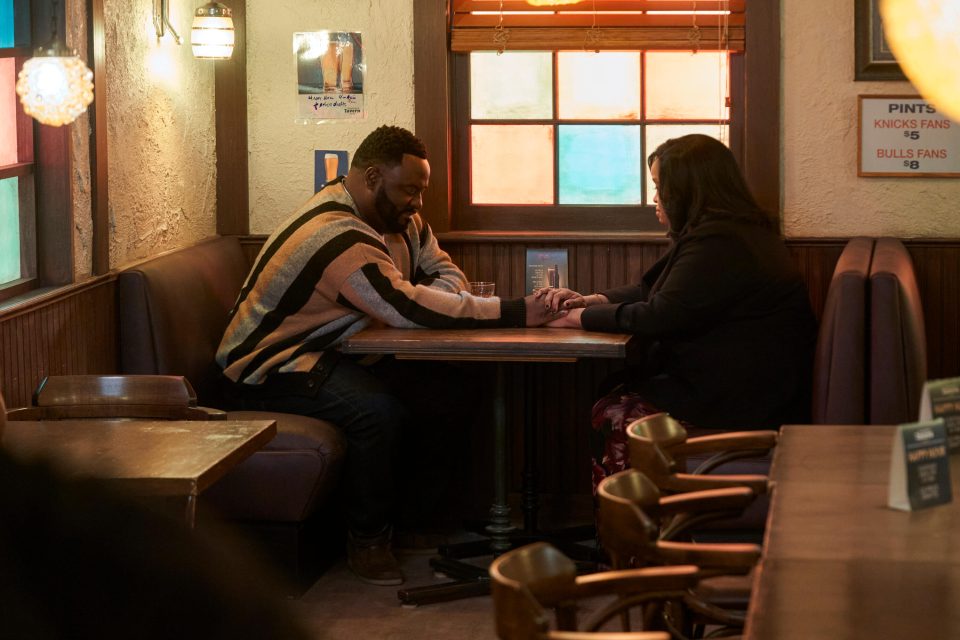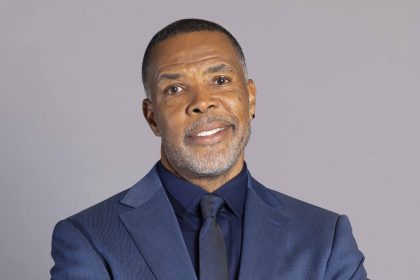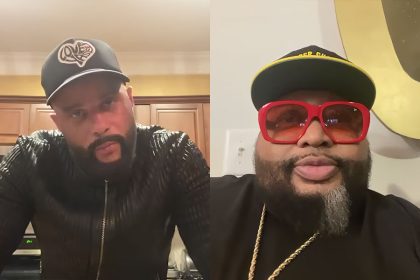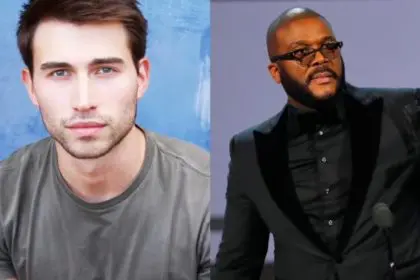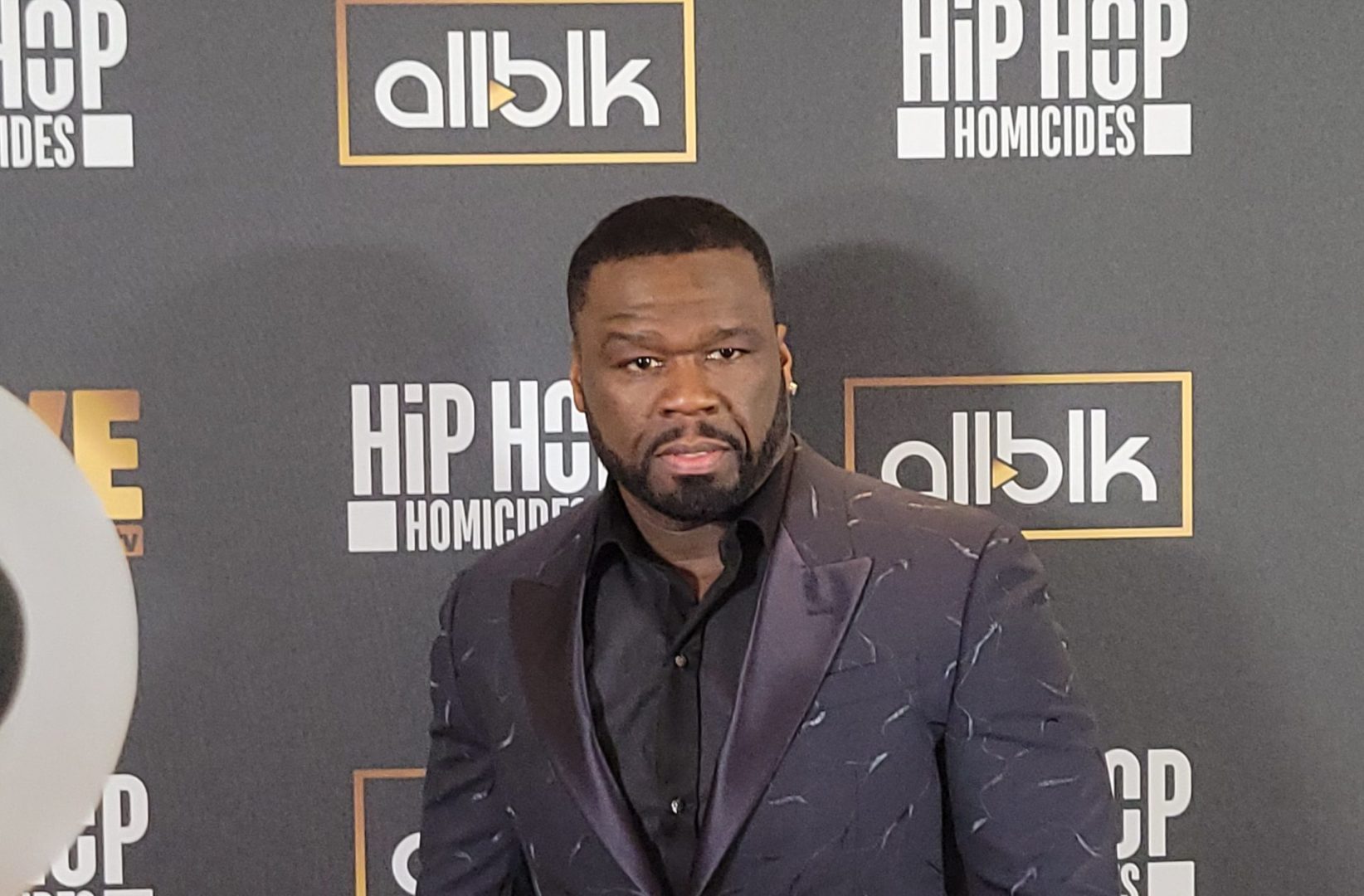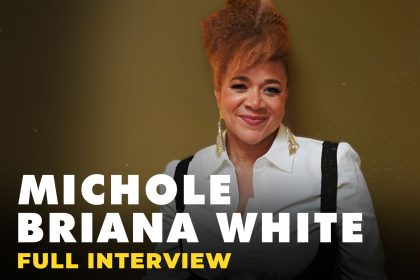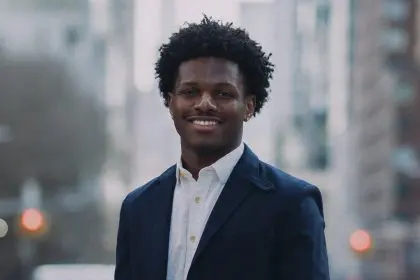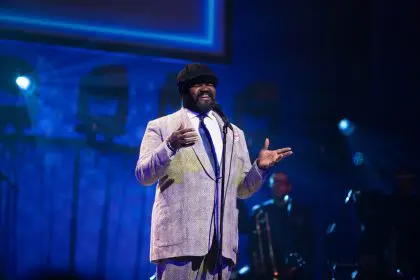Bashir Salahuddin, an Emmy-nominated actor, director, writer, and producer, continues to make a significant impact in Hollywood with his dedication to authentic and diverse storytelling. Raised on the south side of Chicago as one of six children, Salahuddin enjoys a journey to the big screen that is a tale of passion and perseverance. A Harvard University alumnus and member of the Hasty Pudding Theatricals, he has crafted a multifaceted career both in front of and behind the camera. Known for his roles in Top Gun: Maverick and South Side, Salahuddin now stars in the upcoming ABC series How to Die Alone. Through an overall deal with Warner Bros. TV, he and his creative partner Diallo Riddle are shaping projects that highlight the richness of Black culture, proving that Salahuddin is more than an actor — he’s a visionary force in the entertainment industry.

This is Munson Steed, and welcome to “Star Studio,” where we bring you some of the biggest stars making a contribution to the culture each and every day. I am proud and ecstatic to see the smallest man in Hollywood doing big work, all the way from the south side of Chicago, which is where I am today, having a good time here in the first DuSable. What’s going on, Bashir? How are you, man?
Oh my goodness, I’m doing good. Shout out to you. Shout out to DuSable. It’s good to be here. I love rolling out.
When you think about Hollywood and making your mark, you’re coming one of my faves, the one, the only ROP Bernie Mac. Boom.
Big fan of his.
You both were strong, what I consider iconic. How is it that you’ve enjoyed mastering this craft, given coming from a huge city of brilliant, active comedians out of Chicago?
I think you just nailed it. I mean, Chicago is a city people don’t realize really supports the arts more than many other cities I’ve been in. We have everything between the ETA Theater to, the hip-hop Ballet Theater called Hiplet, to doing stuff at the Regal Theater, the Arie Crown, doing, of course, obviously, the stalwarts, the Goodman, Steppenwolf.
But then also, when I was in high school, they made it a big point to take us to the Chicago Symphony Orchestra, to take us to go see plays and operas. It just felt like, if you love the arts, this city is set up for you. I was listening to a comedian talk about back in the day, and I didn’t even know this because I knew of this. There’s a bar called the 50 Yard Line, the grown folks’ bar in Chicago. But I didn’t know that the 50 Yard Line used to host a stand-up night back in the day. I don’t know if they do it anymore, but it’s just like that kind of thing where, Chicago has so much creativity bursting at the seams. It can come from anywhere.
You might go to what you think is a lounge, and it might be people doing stand-up, there’s somebody doing spoken word, there’s somebody playing live jazz. The big lounge scene in Chicago. So there’s always music, there’s always a sense that art and creativity are very important to life. That’s what I was raised in. That’s what I was born in, and I took to it. I started doing theater back at my community center when I was growing up on the south side, and then all the way through high school. So for me, it was always, I always felt grateful that I was in a place that encouraged you to be artistic.
Following that same theme, you’re on a brand new show completely. You’re killing it. What is it to grow the chemistry between you and a leading lady who happens, at some point, to be Black?
I think it comes from, in some ways, chemistry is the result of things you can’t control. It’s like, when two people have chemistry, there’s no way to game plan that; they just have it. But when it comes to performing, you can prepare yourself. You can prepare yourself to be receptive to what they’re saying. You can prepare yourself to listen better. You can prepare yourself to make sure that you are so aware of the script that things feel natural when you say them.
I think all the preparation and all that work comes into play so that by the time you get to spend with somebody who—it also helps if you have tremendous respect for the person. For me, Natasha Rothwell plays Mel; she’s the lead of the show. She’s somebody who’s been killing it and stealing scenes for years. So I know she’s bringing her A-game. So for me, when I’m getting that script, and I’m working on it at home, doing my homework, I know, “Hey, you gotta bring your A-game,” because when you show up on that set, hey, there’s no rookies. The set is all pros, all starters.
This is all top-five people. Nobody on the bench is playing tonight. So that’s kind of what the mentality is. It’s like, get out there, put up your points, grab your rebounds, because this is an important game. She’s gonna be leading us to victory. So I’m grateful for that because sometimes, when you work, you don’t always be in a situation where they expect you to bring your best. This show, “How to Die Alone,” is one of those cases where I was expected to, and I was very grateful to bring my best every single day.
Glad you said that. “How to Die Alone.” But “How Not to Die Alone,” as a Black actor, being able to challenge the writers to really respect what it is. Obviously, you’re my brother, so I see you as a genius on screen. But literally, how do you share and show, for those other young actors, how do you have the courage to say, “Hey, that’s a nuance, and I love it, so I’m going to lean in more”?
Uh, it’s repetition. It’s reps. If you’re a football player, I’m always marveling at this. I always marvel at quarterbacks who can look at the defense and sniff out what’s about to happen because they’ve done it so many times, and they know if the safety takes three steps this way, okay, that means this. That means this person is moving. That means either they’re showing it, so they’re faking that. But, you can have somebody tell that to you. But you don’t, you won’t notice it.
You can get on the football field; you will not notice it, and your ass is gonna take a sack. It’s not until you do it. And when you’ve been doing it since middle school, high school, college, now you’re in the pros. Now you see it. Now you know it. You’ve been doing it for so long. And I think the same thing applies as a performer. You’ve got to do the thing. I always tell young people, and they often ask me because I’ll do seminars, and they say, “Well, you know, how do I get where I want to go?” I’m always telling them, you’ve got to make stuff.
All this thing about meetings and meeting people and shaking hands and getting to know people and networking, if you want to do that stuff, that’s great. It could be helpful. What’s really going to draw people to you is your work. People want to see the movie you make and be like, “Yo, did you see this thing? It’s called ‘Do the Right Thing.’ It’s a young brother out of Brooklyn. It’s an original voice. He writes his own slang. He makes his own stuff up. It feels a little bit like Martin Scorsese, but it also feels really original.”
That’s what you have to do. So I always tell people, “Make stuff, find your voice” because I promise you, even before he made “Do the Right Thing,” I’m sorry, not “Do the Right Thing,” I was thinking “She’s Gotta Have It.” That’s actually the movie. I was trying to say “She’s Gotta Have It.” That’s the one where people were like, “Yo, this guy’s got something special.” But before Spike Lee made “She’s Gotta Have It,” he made other stuff. He made experimental films. He made things that you and I will never look at.
The same thing for your best musicians. I promise you, before Prince made “Controversy,” and before he made “Purple Rain,” there’s a bunch of songs that are like, okay, and he never let you hear them. But those are places where he was learning his craft. He was figuring out how to be him. Acting is like that. You’ve got to do the work. You’ve got to go through plays. You’ve got to make short films. You’ve got to make internet films. You’ve just got to keep doing it. And then, at some point, you start to develop the muscle, and it becomes involuntary.
The idea of working in the travel industry and having a new environment for us to go, what’s that like, knowing that you’re moving once again? Obviously, you and the leading lady, the conversation, you know, we’re in each industry. And I really, even with the trailer, she’s raising the expectation for herself, and she’s saying to take up space, and that’s all women. What are you saying to the brothers that are going to see you perform next to her and support her?
First, I want to say, please marry a White woman — no, I wasn’t going to let that fly! My character is married to a white woman in the show. I think it’s really also one of those things where everything that we see my character do, in some way, can be traced back to some stuff that happened in his family. So he’s still grieving his father, a relationship that was very complicated. I know we can all relate to that. He’s also under pressure from his mom to be the sort of perfect Black man that she always wanted him to be.
She’s even given him, not explicitly sometimes, but definitely a little bit of grief in terms of the culture that he would marry a woman not from his culture. That he would make all these choices, but you realize on his end, a lot of these choices he made were because they were defiant because he felt like people were expecting him to go left, and so he was tired of going left, so he went right. It really is somebody who is, in some ways, not in charge of their own destiny and is trying to find little bitty ways to have some kind of power and authority.
I hope when people see that, they realize the reality of it, and I hope they realize, if they see themselves in it, that it ain’t too late to turn things around. Because this whole show is about turning stuff around. It’s about finding characters in one place who have to own up to the things that they have not done and then turn that corner and go out and be better. So that’s really where we find him. We find him in a place where he’s gotta make some decisions and try, at least, to make some changes.
So even as we look at you now, what would be some of those big moments if you move from doing what you’re doing now to kind of directing? What would you like to do? Because, well, I can be creative, but we’re going to let you be the creative, and you’re pitching that next. Obviously, not what you’ve got written down now, but just what’s missing in that landscape of conversation.
Well, somebody asked me — it’s a great question — because somebody asked me recently, like, I had a show that got canceled. We know how they get canceled. I said, “Well, I can sit here and tell you about the numbers, but there are shows that have worse numbers than us that are still on the air.” The real reason is that the person who makes those decisions doesn’t look like you and me. That’s actually what the truth is.
Is that in order for us to, in some way, begin to tell better versions of our own stories. We said, well, even if you look at the popular sitcoms that feature Black people of the ’70s, very few of those were written by Black people. They might have even been inspired by, created by, perhaps had their ideas stolen from a Black person. But in terms of the day-to-day writing of all those shows, those were White guys writing all those shows. I’m not saying White women because that is not the truth.
The truth is, it was mostly White dudes writing our history, writing our stories, and telling us what about ourselves is interesting. And so, slowly but surely, that changed. It still happens, but it’s changing. There are still people. Now you have people like Kenya Barris and Issa Rae who lead the charge of making sure we tell our own stories. Now, Natasha Rothwell is doing that too. But to answer your question, specifically in terms of the future, that’s what we need.
We need more people who are able to shepherd the great stories from Black folks and keep them around. When the question becomes, “What’s going to get renewed? What’s going to get another season? What’s going to get more light?” The people making those decisions don’t look like us, and I think that’s something we can begin to change. That’s something that’s very important for me. I’m from Chicago, I have this idea more and more of really putting energy towards starting an entertainment company.
I’m looking to maybe do it in Chicago because Chicago has some of the most underrated talent in America. I know that because I did a show there for three years. And so, there are ways for us to begin to own our own destiny, and I think those have to be embraced. Because what’s the alternative? Continuing to let others make the decisions for us? I think we know how that goes.
I want to thank you for coming on “Star Studio” and rolling out. Next time you’re in Chicago, reach out.
Okay, yeah, thanks for having me.
Amazing. I really appreciate it. You come hang out with us here. Thank you, brother.
Thank you.
